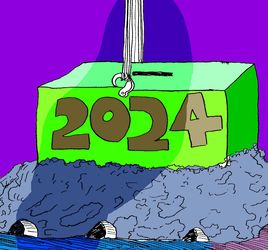2024 is the biggest election year in history. Voting takes place in 40 countries, representing over 40 per cent of global GDP and population. Polling occurs against the backdrop of polycrisis—terrible wars in Gaza and Ukraine, climate change, skyrocketing global debt and stinging prices. Says billionaire investor Paul Singer, “The world is now completely dependent on the good sense of leaders to avoid an Armageddon.”
But good sense is in short supply because political leadership is in crises. Fatal failure of leadership is proven by the ongoing wars that have shattered the spine of nations and the life and limb of its citizens. The elections of 2024 are a spectacle of democracy—in glory and in disarray. IDEA, the Stockholm-based intergovernmental organisation, reported last month that authoritarianism is on the rise and democracy has declined in 85 countries.
Still, as Winston Churchill said, “Democracy is the worst form of government—except for all the others that have been tried.” The year begins with elections in Bangladesh, followed by tiny Taiwan—an arena for US-China political proxy wars. Disinformation, deep fakes and demonisation are rampant as politicians divert public attention from poor governance. In Indonesia, the leading candidate Prabowo Subianto, a fiery populist and Suharto-era lieutenant general, sugarcoats his controversial image. For the first time since apartheid ended, South Africa’s ruling African National Congress is expected to lose its majority, forcing a fractious coalition to tackle crime, corruption and collapsing infrastructure.
In a crowded, televised event, Artyom Zhoga, a Russian veteran from the Ukraine war, urged Vladimir Putin to run for presidential elections again. If Zhoga hadn’t, he would probably have had to run for his life. Putin graciously agreed to be the star candidate in a one-horse race that could see him rule Russia until 2036—a 36-year reign. But leaders facing elections in India, Pakistan, Bangladesh and Sri Lanka are unlikely to enjoy such marathon runs. Elections also take place in many countries in Africa, South America, in Canada, Iran, Turkey and Tunisia, the birthplace of the Arab Spring. “It’s a very consequential year,” says Stanford University political scientist Amy Zegart.
Europe will seethe with elections in the UK, Germany, Spain, Portugal, Austria, Belgium and to the European parliament. As in the recent elections in the Netherlands, the far right waxes, riding high on public alarm over migration and impotent mainstream politicians. People now are less afraid of the far right. In Italy, Finland and Sweden, co-option into government has defanged right-wingers.
Saving the worst for the last, the US elections are the most consequential of them all. A Donald Trump victory will alter the trajectory of the two wars, NATO’s future, accelerate climate change, polarisation and protectionism. Election campaign will froth with hate, hostility and conspiracy theories. Democrats and Republicans will compete in China-bashing, a vote-getting ploy that deflects attention from rising crime, injustice, inequality and falling living standards.
The 2024 elections will end with the US voting on November 5, celebrated in parts of the world as Guy Fawkes Day. In 1605, Catholic rebels failed to blow up the English House of Lords and assassinate the protestant King James 1. Guy Fawkes, a ringleader of this “Gunpowder Plot” was hanged, drawn and quartered, becoming a terrorist to the Protestants, but a brave icon of resistance to the Catholics. Fawkes masks endures, surfacing as a symbol of 21st century revolutionary protests—and polarisation—from New York to Hong Kong, Brazil to Thailand. It would require good sense—and good luck—to avoid Armageddon. Tragically, for Gazans, Armageddon is already here.
Pratap is an author and journalist.


